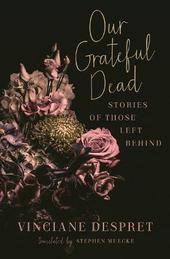
|
Our Grateful Dead: Stories of Those Left Behind
Paperback / softback
Main Details
| Title |
Our Grateful Dead: Stories of Those Left Behind
|
| Authors and Contributors |
By (author) Vinciane Despret
|
|
Translated by Stephen Muecke
|
| Series | Posthumanities |
|---|
| Physical Properties |
| Format:Paperback / softback | | Pages:196 | | Dimensions(mm): Height 203,Width 133 |
|
| Category/Genre | Social and political philosophy
Coping with death and bereavement |
|---|
| ISBN/Barcode |
9781517911416
|
| Classifications | Dewey:306.9 |
|---|
| Audience | | General | | Professional & Vocational | |
|---|
|
Publishing Details |
| Publisher |
University of Minnesota Press
|
| Imprint |
University of Minnesota Press
|
| Publication Date |
21 September 2021 |
| Publication Country |
United States
|
Description
An award-winning exploration of the presence of the dead in the lives of the living A common remedy after suffering the loss of a loved one is to progress through the "stages of grief," with "acceptance" as the final stage in the process. But is it necessary to leave death behind, to stop dwelling on the dead, to get over the pain? Vinciane Despret thinks not. In her fascinating, elegantly translated book, this influential thinker argues that, in practice, people in all cultures continue to enjoy a lively, inventive, positive relationship with their dead. Through her unique storytelling woven from ethnographic sources and her own family history, Despret assembles accounts of those who have found ways to live their daily lives with their dead. She rejects the idea that one must either subscribe to "complete mourning" (in a sense, to get rid of the dead) or else fall into fantasy and superstition. She explores instead how the dead still play an active, tangible role through those who are living, who might assume their place in a family or in society; continue their labor or art; or thrive from a shared inheritance or an organ donation. This is supported by dreams and voices, novels, television and popular culture, the work of clairvoyants, and the everyday stories and activities of the living. For decades now, in the West, the dead have been discreet and invisible. Today, especially as a result of the Covid-19 pandemic, Despret suggests that perhaps we will be willing to engage with the dead in ways that bring us happiness despite our loss. Despret's unique method of inquiry makes her book both entertaining and instructive. Our Grateful Dead offers a new, pragmatic approach to social and cultural research and may indeed provide compassionate therapy for those of us coping with death.
Author Biography
Vinciane Despret is associate professor of philosophy at the University of Liege and the Free University of Brussels. The original French edition of Our Grateful Dead ( Au bonheur des morts) won the prestigious Prix des Rencontres Philosophiques de Monaco. Her books include What Would Animals Say If We Asked the Right Questions? and The Dance of the Arabian Babbler: Birth of an Ethological Theory, both from Minnesota. Stephen Muecke is professor of creative writing at Flinders University, South Australia. His many translations include works by Gilles Deleuze, Roland Barthes, and Luce Irigaray.
Reviews"Vinciane Despret studies reports of the dead interfering in people's lives-to contest, direct, encourage, or console them. This important book will induce psychotherapists to reconsider Freud's concept of the work of mourning and social scientists to understand in new ways the force of political and religious ancestors on society."-Alphonso Lingis "Our Grateful Dead is a stirring and insightful study of the active, metamorphic relations that the dead maintain with the living. With characteristic generosity and grace, Vinciane Despret curates stories from dreams and letters, novels and television, organ donations and home funerals and seances, paying sensitive and subtle attention to the modes of practice and perception most conducive to heeding the enigmatic missives of the dead-and making them real."-Matthew Chrulew, coeditor of Extinction Studies: Stories of Time, Death, and Generations
|